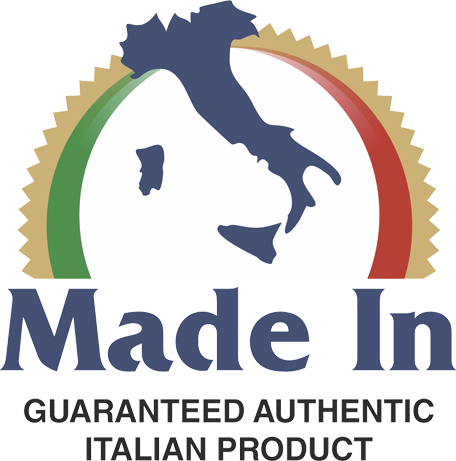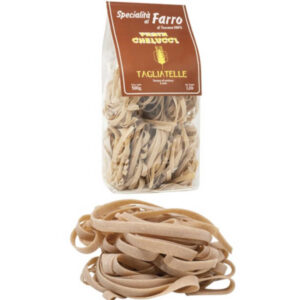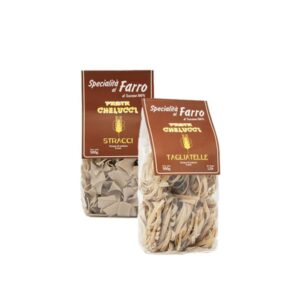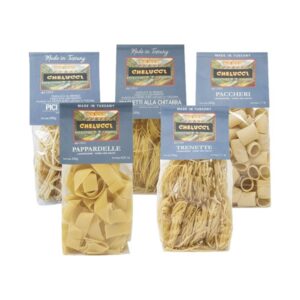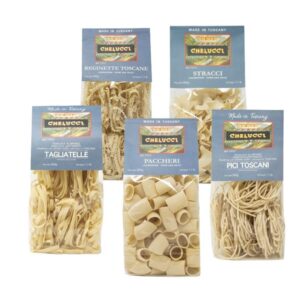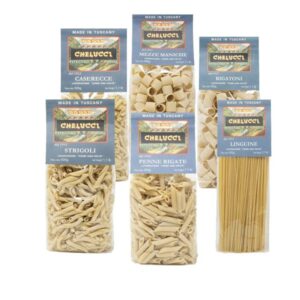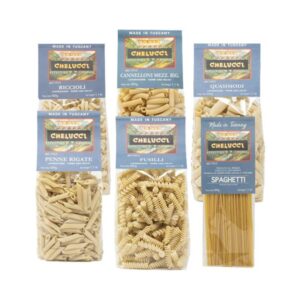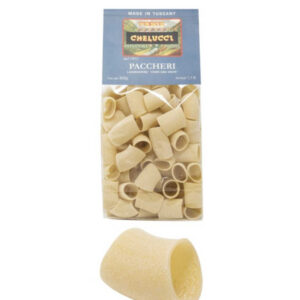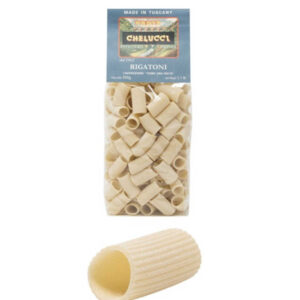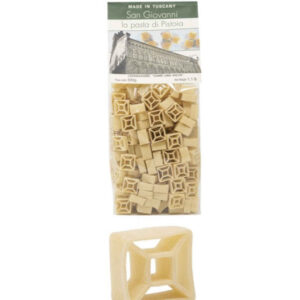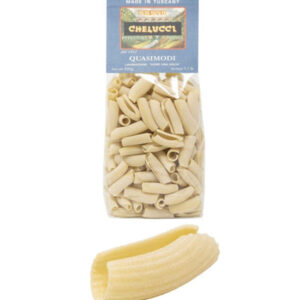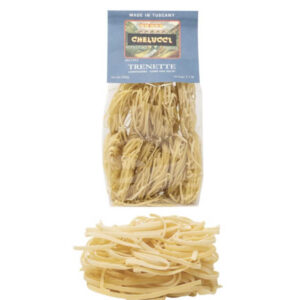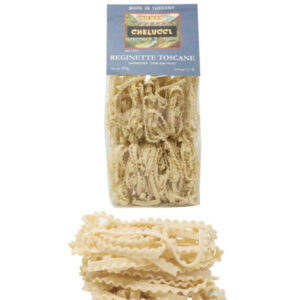-
STRACCI TUSCAN SPELT
STRACCI- TUSCAN SPELT
STRACCI TUSCAN SPELT
The pasta is sold in cartons of 10 Stracci packs of 500g = 5KgThe Stracci of Tuscan spelt from the Chelucci Pastificio is a 100% Tuscan spelt pasta from Garfagnana at Km0 (zero miles);
dried at low temperature, to fully preserve all the nutritional properties of the wheat.
The pasta is bronze drawn to give it a rough and porous consistency which improves the quality, especially of the spelt.
Its production is completely artisanal following the Tuscan tradition from the selection of the spelt to the packaging.39,00€ + VATSTRACCI TUSCAN SPELT
39,00€ + VAT -
TAGLIATELLE STRACCI TUSCAN SPELT
TAGLIATELLE STRACCI- TUSCAN SPELT – PACKAGE-08
TAGLIATELLE STRACCI of TUSCAN SPELT
The pasta is sold in cartons of 10 tagliatelle and stracci packs of 500g = 5KgThe package of high quality durum wheat semolina pasta tagliatele and stracci is composed of:
- 93F Stracci Farro x 5 pack. 500gr
- 118F Tagliatelle Farro x 5 pack. 500gr
The Tagliatelle and stracci of Tuscan spelt from the Chelucci Pastificio is a 100% Tuscan spelt pasta from Garfagnana at Km0 (zero miles);
dried at low temperature, to fully preserve all the nutritional properties of the wheat.
The pasta is bronze drawn to give it a rough and porous consistency which improves the quality, especially of the spelt.
Its production is completely artisanal following the Tuscan tradition from the selection of the spelt to the packaging.46,90€ + VATTAGLIATELLE STRACCI TUSCAN SPELT
46,90€ + VAT -
PACCHERI PICI STELLA PAPPARDELLE… PACKAGE-07
PICI STELLA PACCHERI PAPPARDELLE TRENETTE – PACKAGE-06
OF TUSCAN DURUM WHEAT
PICI STELLA PACCHERI PAPPARDELLE TRENETTE TOSCANE OF TUSCAN DURUM WHEAT
The pasta is sold in cartons of 10 Pici stella paccheri pappardelle trenette toscane packs of 500g = 5KgThe package of high quality durum wheat semolina pasta Pici stella paccheri pappardelle trenette toscane is composed of:
- 21 Pici Stella x 2 pack. 500gr
- 106 Paccheri x 2 pack. 500gr
- 016 Pappardelle x 2 pack. 350 gr
- 109 Trenette x 2 pack. 500 gr
The pasta of Tuscan durum wheat from Pastificio Chelucci is a 100% Tuscan durum wheat semolina pasta at Km0(Zero miles);
dried at low temperature, to fully preserve all the nutritional properties of the wheat.
The pasta is bronze drawn to give it a rough and porous texture which improves its quality.
Its production is completely handcrafted following the Tuscan tradition from the selection of raw materials to packaging.34,40€ + VATPACCHERI PICI STELLA PAPPARDELLE… PACKAGE-07
34,40€ + VAT -
PACCHERI PICI TOSCANI TAGLIATELLE.. PACKAGE-06
PICI TOSCANI TAGLIATELLE PACCHERI STRACCI REGINETTE TOSCANE – PACKAGE-06
OF TUSCAN DURUM WHEAT
PICI TOSCANI TAGLIATELLE PACCHERI STRACCI REGINETTE TOSCANE OF TUSCAN DURUM WHEAT
The pasta is sold in cartons of 10 Pici toscani tagliatelle stracci reginette toscane packs of 500g = 5KgThe package of high quality durum wheat semolina pasta cannelloni riccioli quasimodi penne rigate fusilli and spaghetti is composed of:
- 13 Reginette Toscane x 2 pack. 500gr
- 118 Tagliatelle x 2 pack. 500gr
- 120 Pici Toscani x 2 pack. 500gr
- 106 Paccheri x 2 pack. 500gr
- 093 Stracci x 2 pack. 500gr
The pasta of Tuscan durum wheat from Pastificio Chelucci is a 100% Tuscan durum wheat semolina pasta at Km0(Zero miles);
dried at low temperature, to fully preserve all the nutritional properties of the wheat.
The pasta is bronze drawn to give it a rough and porous texture which improves its quality.
Its production is completely handcrafted following the Tuscan tradition from the selection of raw materials to packaging.31,00€ + VATPACCHERI PICI TOSCANI TAGLIATELLE.. PACKAGE-06
31,00€ + VAT -
STRIGOLI RIGATONI CASERECCE.. PACKAGE-05
RIGATONI MEZZE MANICHE CASERECCE STRIGOLI PENNE LINGUINE – PACKAGE-05
OF TUSCAN DURUM WHEAT
RIGATONI MEZZE MANICHE CASERECCE STRIGOLI PENNE LINGUINE OF TUSCAN DURUM WHEAT
The pasta is sold in cartons of 12 Strigoli rigatoni caserecce penne rigate e linguine packs of 500g = 6KgThe package of high quality durum wheat semolina pasta cannelloni riccioli quasimodi penne rigate fusilli and spaghetti is composed of:
- 73 Mezze Maniche x 2 pack. 500gr
- 089 Caserecce x 2 pack. 500gr
- 074 Rigatoni x 2 pack. 500gr
- 096 Strigoli x 2 pack. 500gr
- 087 Penne Rigate x 2 pack. 500gr
- 013 Linguine x 2 pack. 500gr
The pasta of Tuscan durum wheat from Pastificio Chelucci is a 100% Tuscan durum wheat semolina pasta at Km0(Zero miles);
dried at low temperature, to fully preserve all the nutritional properties of the wheat.
The pasta is bronze drawn to give it a rough and porous texture which improves its quality.
Its production is completely handcrafted following the Tuscan tradition from the selection of raw materials to packaging.30,00€ + VATSTRIGOLI RIGATONI CASERECCE.. PACKAGE-05
30,00€ + VAT -
RICCIOLI PENNE CANNELLONI SPAGHETTI.. PACKAGE-04
RICCIOLI CANNELLONI PENNE RIGATE FUSILLI SPAGHETTI QUASIMODI – PACKAGE-04
OF TUSCAN DURUM WHEAT
CANNELLONI RICCIOLI PENNE RIGATE FUSILLI SPAGHETTI QUASIMODI OF TUSCAN DURUM WHEAT
The pasta is sold in cartons of 12 cannelloni riccioli quasimodi penne rigate fusilli e spaghetti packs of 500g = 6KgThe package of high quality durum wheat semolina pasta cannelloni riccioli quasimodi penne rigate fusilli and spaghetti is composed of:
- 063 Cannelloni mezzani Rigati x 2 pack. 500gr
- 090 Riccioli x 2 conf. 500gr
- 094 Quasimodi x 2 pack. 500gr
- 087 Penne Rigate x 2 pack. 500gr
- 095 Fusilli x 2 pack. 500gr
- 005 Spaghetti x 2 pack. 500gr
The pasta of Tuscan durum wheat from Pastificio Chelucci is a 100% Tuscan durum wheat semolina pasta at Km0(Zero miles);
dried at low temperature, to fully preserve all the nutritional properties of the wheat.
The pasta is bronze drawn to give it a rough and porous texture which improves its quality.
Its production is completely handcrafted following the Tuscan tradition from the selection of raw materials to packaging.30,00€ + VATRICCIOLI PENNE CANNELLONI SPAGHETTI.. PACKAGE-04
30,00€ + VAT -
PACCHERI TUSCAN DURUM WHEAT
PACCHERI – TUSCAN DURUM WHEAT
PACCHERI TUSCAN DURUM WHEAT
The pasta is sold in cartons of 10 paccheri packs of 500g = 5KgThe Paccheri of Tuscan durum wheat from Pastificio Chelucci is a 100% Tuscan durum wheat semolina pasta at Km0(Zero miles);
dried at low temperature, to fully preserve all the nutritional properties of the wheat.
The pasta is bronze drawn to give it a rough and porous texture which improves its quality.
Its production is completely handcrafted following the Tuscan tradition from the selection of raw materials to packaging.31,00€ + VATPACCHERI TUSCAN DURUM WHEAT
31,00€ + VAT -
RIGATONI TUSCAN DURUM WHEAT
RIGATONI – TUSCAN DURUM WHEAT
RIGATONI TUSCAN DURUM WHEAT
The pasta is sold in cartons of 12 rigatoni packs of 500g = 6KgThe Rigatoni of Tuscan durum wheat from Pastificio Chelucci is a 100% Tuscan durum wheat semolina pasta at Km0(Zero miles);
dried at low temperature, to fully preserve all the nutritional properties of the wheat.
The pasta is bronze drawn to give it a rough and porous texture which improves its quality.
Its production is completely handcrafted following the Tuscan tradition from the selection of raw materials to packaging.30,00€ + VATRIGATONI TUSCAN DURUM WHEAT
30,00€ + VAT -
SAN GIOVANNI PISTOIA
SAN GIOVANNI PISTOIA – TUSCAN DURUM WHEAT
SAN GIOVANNI PISTOIA TUSCAN DURUM WHEAT
The pasta is sold in cartons of 12 San giovanni Pistoia packs of 500g = 6KgThe San Giovanni Pistoia of Tuscan durum wheat from Pastificio Chelucci is a 100% Tuscan durum wheat semolina pasta at Km0(Zero miles);
dried at low temperature, to fully preserve all the nutritional properties of the wheat.
The pasta is bronze drawn to give it a rough and porous texture which improves its quality.
Its production is completely handcrafted following the Tuscan tradition from the selection of raw materials to packaging.37,20€ + VATSAN GIOVANNI PISTOIA
37,20€ + VAT -
QUASIMODI TUSCAN DURUM WHEAT
QUASIMODI – TUSCAN DURUM WHEAT
QUASIMODI TUSCAN DURUM WHEAT
The pasta is sold in cartons of 12 quasimodi packs of 500g = 6KgThe Penne rigate of Tuscan durum wheat from Pastificio Chelucci is a 100% Tuscan durum wheat semolina pasta at Km0(Zero miles);
dried at low temperature, to fully preserve all the nutritional properties of the wheat.
The pasta is bronze drawn to give it a rough and porous texture which improves its quality.
Its production is completely handcrafted following the Tuscan tradition from the selection of raw materials to packaging.30,00€ + VATQUASIMODI TUSCAN DURUM WHEAT
30,00€ + VAT -
TRENETTE TUSCAN DURUM WHEAT
TRENETTE – TUSCAN DURUM WHEAT
TRENETTE TUSCAN DURUM WHEAT
The pasta is sold in cartons of 10 trenette packs of 500g = 5KgThe Trenette of Tuscan durum wheat from Pastificio Chelucci is a 100% Tuscan durum wheat semolina pasta at Km0(Zero miles);
dried at low temperature, to fully preserve all the nutritional properties of the wheat.
The pasta is bronze drawn to give it a rough and porous texture which improves its quality.
Its production is completely handcrafted following the Tuscan tradition from the selection of raw materials to packaging.31,00€ + VATTRENETTE TUSCAN DURUM WHEAT
31,00€ + VAT -
REGINETTE TOSCANE – TUSCAN REGINETTE
REGINETTE TOSCANE – TUSCAN DURUM WHEAT
REGINETTE TOSCANE TUSCAN DURUM WHEAT
The pasta is sold in cartons of 10 Reginette packs of 500g = 5KgThe Reginette toscane of Tuscan durum wheat from Pastificio Chelucci is a 100% Tuscan durum wheat semolina pasta at Km0(Zero miles);
dried at low temperature, to fully preserve all the nutritional properties of the wheat.
The pasta is bronze drawn to give it a rough and porous texture which improves its quality.
Its production is completely handcrafted following the Tuscan tradition from the selection of raw materials to packaging.31,00€ + VATREGINETTE TOSCANE – TUSCAN REGINETTE
31,00€ + VAT
PASTIFICIO (Pasta factory) CHELUCCI
Chelucci family or pastificio has been producing pasta in an artisanal way since 1912; the company, founded by grandfather Edoardo, is still located in the historic plant in Piteccio, near a source of pure water in the scenery of the Pistoia hills.
“Pasta that Chelucci makes is very good” wrote Renzo Benedetti, a fourth grade pupil of the Piteccio schools in 1929.
The document is kept in the archives of the Forteguerra Library in Pistoia and testifies that even then the production of the Chelucci Pastificio was known and appreciated.
The origins date back to the early twentieth century, in 1912 the company found its historic headquarters, located near the water source in the village of Piteccio.
Piteccio on the Pistoia hills, where it is still located today.
The structure originally housed a small paper mill, later transformed into a wool mill and, finally, into a pasta factory, by the hand of a certain Gualtierotti.
In 1912 the Chelucci brothers, Edoardo and Terzo, took over the business and expanded it.
In the Second World War, which forced the Chelucci family to stop production and leave Piteccio displaced in Florence.
After the war the Cheluccis returned to the company, reactivated production and were one of the first companies in the Pistoia area to resume business.
In the 1970s, Edoardo’s grandson, Giuseppe, also decided to join the company. Just as his father Renato had done, and he is still at the helm today: since then, expansion into foreign markets has begun.
Chelucci pasta today is a Made in Italy excellence sold throughout Italy and exported all over the world.
Quality raw materials
The products of the Chelucci pasta factory are an expression of the best Italian tradition.
From the semolina to the eggs, to the water used for the dough: everything is carefully chosen and processed in an artisanal way.
All in order to maintain the organoleptic characteristics of the materials and give the pasta a totally natural flavor.
Chelucci pasta is a high quality product, according to the best Italian tradition. Starting from the choice of highly selected raw materials, 100% Tuscan at km 0 (Zero miles), because no product can be excellent without truly exceptional ingredients.
Durum wheat pasta is mixed exclusively with top quality semolina, the spelled used is only 100% pure Tuscan.
Senatore Cappelli ancient wheat semolina used for ancient wheat specialties is certified by the Ancient Grains Association.
The eggs are strictly fresh and the water is pure from the spring located near the factory.
Craftsmanship
All this is combined with craftsmanship, which allows the organoleptic characteristics of the raw materials to be maintained unaltered and allows the product to be given the totally natural flavor of artisan pasta.
Attention to the raw materials is combined with the care of the entire manufacturing process.
Chelucci pasta is kneaded exclusively as it once was, and drawn with bronze dies, which give the product the right roughness.
Pasta of the Pastificio Chelucci is kneaded exclusively as it once was, with and drawn with bronze dies.
Bronze dies gives the product the right roughness, while maintaining the organoleptic characteristics and the totally natural flavor of the artisan pasta unaltered.
Drying takes place on frames placed in wooden cells at low temperatures (30 ° -35 °), for shorter or longer periods depending on the format.
The packaging of the special formats is made entirely by hand, to give that unique and inimitable aspect to the product.
And for the egg pasta still today the pasta makers of the Pastificio Chelucci follow the traditional recipe.
Traditional recipe : 5 fresh eggs for every kilo of durum wheat semolina and for the long pasta skeins the nests must be made strictly by hand.
Chelucci in Italy and in the world
Pastificio Chelucci today is a BRAND of guarantee and quality of made in Italy.
It exports all over the world and in particular to Germany, Holland, France, Spain and Great Britain, where Chelucci pasta is particularly appreciated.
Over time, the market has expanded further, with Australia and the Czech Republic as well as other nations that appreciate artisanal pasta made in Italy.
[/ expander_maker]


